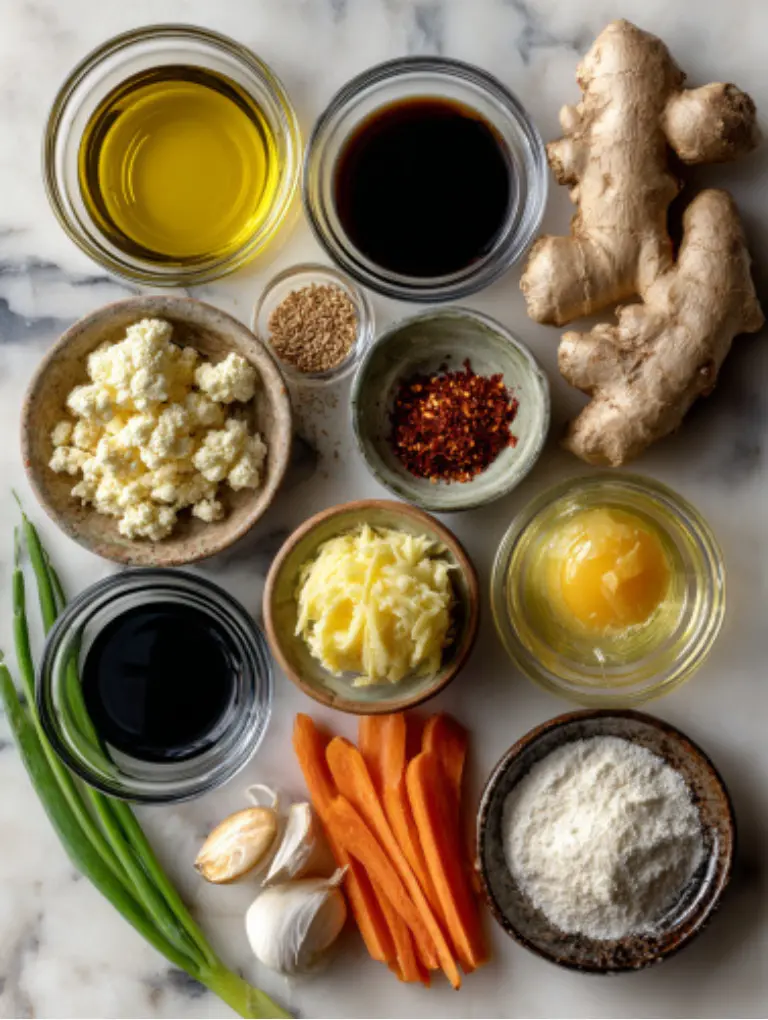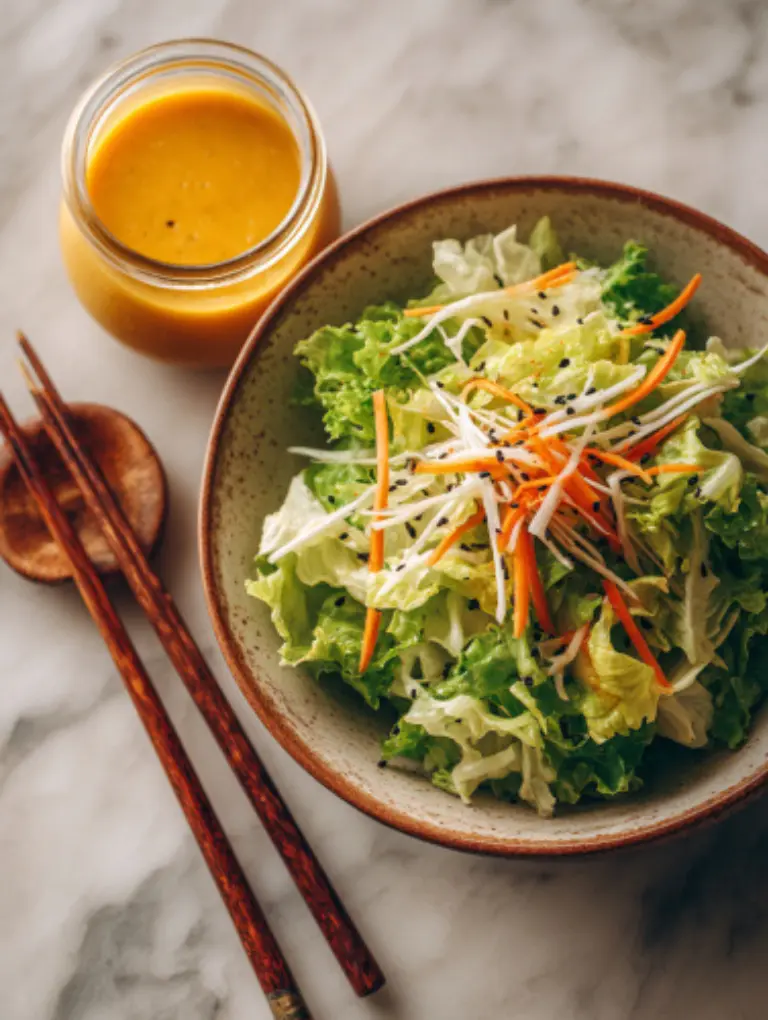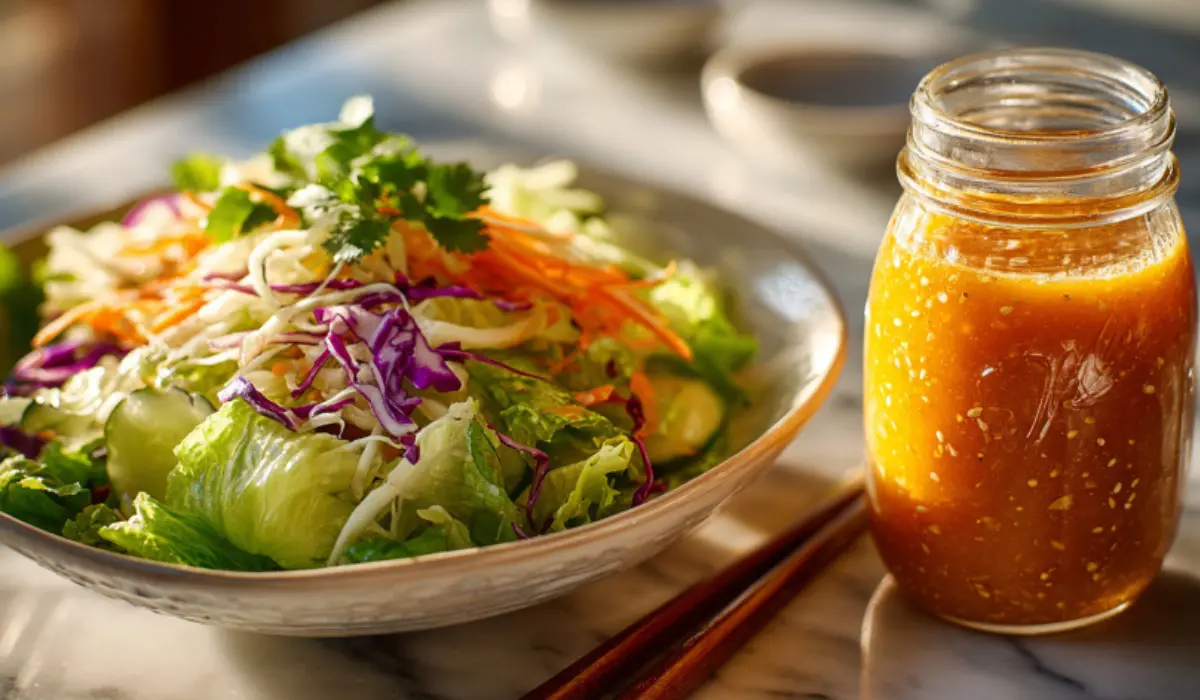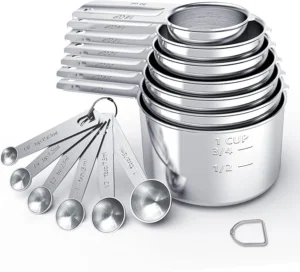Japanese Ginger Salad Dressing brings bold, fresh flavors straight to your table in just minutes. This bright orange dressing, often served in Japanese American restaurants, blends carrot, ginger, and onion into a zesty sauce that instantly wakes up any salad. It’s tangy, a little sweet, and full of ginger’s signature kick. With a quick whirl in the blender, you can recreate that classic restaurant flavor at home. The best part? It takes only 10 minutes, yet tastes like it came from your favorite hibachi spot.
Table of Contents
Why You Will Love This Japanese Ginger Salad Dressing
- Quick and easy: It takes just 10 minutes from prep to table.
- Bold flavor: Fresh ginger, sweet carrot, and tangy rice vinegar make every bite pop.
- Simple ingredients: Most items are pantry staples, with just a few fresh produce additions.
- Restaurant style at home: Get the same flavor you love from hibachi or sushi restaurants without leaving your kitchen.
- Versatile uses: Beyond salads, it doubles as a dip for veggies or a drizzle over grilled chicken, shrimp, or tofu.
This dressing isn’t just tasty, it’s also practical and it fits right into our Healthy Weight Loss Recipes. You can make it ahead, keep it in the fridge, and enjoy vibrant flavor all week, and for a refreshing pairing try the Natural Mounjaro Recipe with Green Tea. It’s one of those recipes that proves delicious doesn’t have to be complicated.
Ingredients Needed

Base
- Neutral oil: A light oil like canola or grapeseed keeps the flavor balanced.
- Unseasoned rice vinegar: Adds tang without overpowering sweetness.
- Soy sauce or tamari: Brings salty depth and umami.
Aromatics
- Fresh ginger: The star ingredient, peel and chop before blending.
- Onion: Adds sharpness and body.
- Garlic (optional): For extra savory punch.
Flavor Boosters
- Carrot: Gives natural sweetness, color, and texture.
- White miso: Creamy richness and subtle umami.
- Sugar or honey: Balances the acidity.
- Toasted sesame oil: A little goes a long way for nutty depth.
Optional Add-Ins
- Lemon juice or mirin: To brighten the flavor.
- Chili flakes or white pepper: For subtle heat.
Notes & Substitutions
- Gluten-free: Use tamari or coconut aminos in place of soy sauce.
- Soy-free: Swap miso with chickpea miso or skip it, and use coconut aminos instead of soy.
- Low-sodium: Try reduced-salt soy or dilute with a splash of water.
- No-carrot version: Use extra onion and ginger for a clearer, lighter dressing.
- Miso version: Keeps the texture creamier and adds depth.
- No added sugar: Rely on carrot’s natural sweetness or use a little apple.
How to Make Japanese Ginger Salad Dressing
- Prep the produce
Peel and roughly chop the carrot, onion, and fresh ginger. Smaller pieces blend more smoothly. - Start with aromatics
Add the chopped carrot, onion, and ginger to a blender or food processor. Blend until finely puréed. This creates the base flavor. - Add seasonings
Spoon in the miso, sugar, salt, and pepper. Blend again so the seasonings mix evenly with the aromatics. - Finish with liquids
Pour in the rice vinegar, neutral oil, and sesame oil. Blend until the mixture is completely smooth and emulsified. The dressing should look creamy and bright orange. - Taste and adjust
Try a small spoonful. Add more vinegar if you like extra tang, a pinch more sugar for balance, or more ginger for extra bite. - Chill and serve
Transfer to a jar and refrigerate for at least 30 minutes. This helps the flavors meld. Shake before serving over salads or drizzling onto proteins.
Pro Tips & Troubleshooting
Expert Tips
- Grate ginger finely if your blender struggles it prevents stringy bits.
- Add liquids slowly after blending the aromatics, which helps the dressing emulsify into a creamy texture.
- Chill before serving 30 minutes in the fridge makes the flavors brighter and more balanced.
- Use a high-speed blender if available, for a silky finish.
Common Mistakes to Avoid
- Overpowering onion: Stick to the recipe amount; too much raw onion can make the dressing harsh.
- Heavy sesame oil: A teaspoon is enough. More can overwhelm the balance.
- Not blending long enough: Stop too soon and you’ll have a chunky dressing. Blend until smooth and creamy.
Creative Shortcut
- Make a double batch and freeze in ice cube trays. Pop out a cube whenever you need a quick dressing or marinade.
Serving, Storage & Variations

Serving Ideas
- Drizzle over a crisp iceberg salad, just like in Japanese steakhouses.
- Spoon onto grain bowls with rice, quinoa, or noodles, and sip a Japanese Mounjaro Detox Drink on the side.
- Use as a sauce for grilled chicken, shrimp, or tofu.
- Pair with steamed vegetables and Japanese Mounjaro Recipe for a fresh, balanced meal.
Storage Guide
- Fridge: Store in a sealed jar for up to 5 days. Shake well before using, as natural separation occurs.
- Freezer: Portion into ice cube trays and freeze. Thaw a cube overnight in the fridge for single servings.
Reheating
- This dressing is best served chilled. If frozen, thaw gently do not microwave, as heat changes the flavor.
Variations
- Benihana-style copycat: Skip the miso, increase onion for a sharper bite.
- Miso carrot version: Add extra miso for more umami and creaminess.
- Oil-free: Oil free, swap the oil with extra carrot and a splash of water for a lighter texture, then pair it with the pink salt recipe with apple cider vinegar.
- Spicy ginger: Stir in a pinch of chili flakes or a drop of sriracha for heat.
Nutritional Information
Per Serving (approximate, based on 2 tablespoons)
| Calories | Fat | Saturated Fat | Carbohydrates | Sugar | Fiber | Protein | Sodium |
|---|---|---|---|---|---|---|---|
| 121 | 10 g | 0.8 g | 7 g | 5 g | 1 g | 1 g | 170 mg |
Ingredient Benefits
- Ginger: Ginger is known for its anti-inflammatory properties and digestive support, according to the National Center for Complementary and Integrative Health.
- Carrots: Carrots are rich in beta carotene, a source of vitamin A that supports eye and skin health, as noted by the National Institutes of Health.
- Miso: Miso contains probiotics that may help support gut health.
- Rice vinegar: Provides tang without heavy calories, balancing the flavor naturally.
Tip: If you modify ingredients, use tools like Cronometer or MyFitnessPal to recalculate exact nutrition values.
Conclusion
Japanese Ginger Salad Dressing is the kind of recipe that proves simple ingredients can deliver restaurant-quality flavor. In just 10 minutes, you get a bright, zesty dressing that transforms any salad or bowl into something memorable. It’s versatile enough to pair with crisp greens, grilled proteins, or roasted veggies, and it keeps well for quick meals throughout the week.
If you try this recipe, leave a comment and rating to let us know how it turned out. Share your version on Pinterest or Facebook so more people can enjoy it too. What twist did you add — extra miso, a little spice, or maybe a no-oil version? We’d love to hear your spin!
Frequently Asked Questions
Is Japanese ginger dressing authentic in Japan or Japanese American restaurant style?
This dressing is mainly a Japanese American creation. In Japan, salads usually have lighter soy-based dressings, while the carrot-ginger style became popular in US hibachi and sushi spots.
How long does this dressing last in the fridge?
Stored in a sealed jar, it keeps well for about 5 days. Shake before each use to bring the texture back together.
Can I make it without a blender?
Yes. Use a food processor or even a box grater for the vegetables, then whisk everything by hand. The texture won’t be as smooth, but the flavor stays delicious.
How do I make it gluten free or soy free?
For gluten free, replace soy sauce with tamari. For soy free, skip the miso and use coconut aminos instead of soy sauce.
Can I skip the carrot or the miso?
Yes. Leaving out carrot makes a lighter, clear ginger vinaigrette. Omitting miso creates a thinner, sharper version with less umami.
How do I make it less sweet or less salty?
Cut back the sugar or honey and balance with extra carrot. For salt, use low-sodium soy sauce or dilute with a little water.
Why did my dressing separate and how do I fix it?
Natural separation happens. Just shake the jar before serving. For a creamier, stable texture, blend an extra 30 seconds to emulsify well.


















